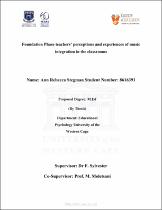| dc.contributor.advisor | Sylvester, Frederick | |
| dc.contributor.author | Stegman, Ann Rebecca | |
| dc.date.accessioned | 2023-12-12T13:41:51Z | |
| dc.date.available | 2023-12-12T13:41:51Z | |
| dc.date.issued | 2023 | |
| dc.identifier.uri | http://hdl.handle.net/11394/10594 | |
| dc.description | Magister Educationis - MEd | en_US |
| dc.description.abstract | Music integration is widely accepted as being an important means of learning other subjects. Despite this, there are many different views about what it is and how best it can be done. While the intention of music integration may be to promote music within the classroom, a decline in the importance of music can occur in actual practice. According to Buthelezi (2016), despite it having been recommended by the South African democratic government that Arts and Culture be part of the school curriculum, many schools continue to avoid or ignore the teaching of this learning area. This study seeks to explore the Foundation Phase Teachers’ perceptions and experiences of integrating music into their lessons. A qualitative case study was used to explore teachers’ perceptions and experiences. Semi-structured interviews were employed to conduct the investigation. Four educators were purposely selected from two schools in the district. The findings showed that the majority of Foundation Phase teachers who participated in the research did not receive any formal music training and that they were only exposed to music during CAPS training at the district office. Furthermore, the teachers who participated in this study would only make the learners sing during the morning ring session before a bible story, the Life Skills (Beginning Knowledge) and Mathematics lesson as an effort to integrate music in their classrooms. Moreover, it became clear that Foundation Phase teachers need practice in their school base settings to hone their teaching skills in delivering meaningful music integration that enhances teaching and learning activities in their classrooms. Recommendations included the partnership between the Western Cape Education Department and the Universities, to make a concerted effort to offer compulsory Creative Art (music) courses to all Foundation Phase pre-service teachers to improve their music knowledge and pedagogy. | en_US |
| dc.language.iso | en | en_US |
| dc.publisher | University of the Western Cape | en_US |
| dc.subject | Foundation Phase | en_US |
| dc.subject | Music integration | en_US |
| dc.subject | Music education | en_US |
| dc.subject | Curriculum and Assessment Policy Statement | en_US |
| dc.subject | Creative arts | en_US |
| dc.title | Foundation Phase teachers’ perceptions and experiences of music integration in the classrooms | en_US |
| dc.rights.holder | University of the Western Cape | en_US |

